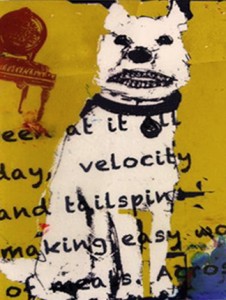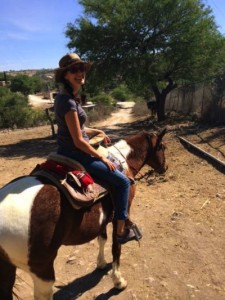 Many years ago I had a yellow and white hound dog named Boomer. One morning my husband and I came into the living room to discover Boomer lying on her back, practically upright, propped against the arm of the sofa. She appeared to be sitting up. “My God,” my husband said, eyes wide. “She’s evolving!” A few weeks later Boomer trotted into the kitchen, howling (her standard greeting). In her mouth was a half-eaten page she had just torn from a magazine. I grabbed it and glanced at it before throwing it away. It was–and here I do not lie–a picture of a yellow and white hound dog. And not long after the magazine incident, my husband and I were sitting in our living room with our three dogs and six friends. We were discussing our respective art careers; the mood of the room was energized and hopeful. As the night wore on and the other dogs slept, Boomer raised her head and assessed the crowd. Suddenly, without provocation or warning, she fixed her gaze on one of the friends and let out a threatening snarl.
Many years ago I had a yellow and white hound dog named Boomer. One morning my husband and I came into the living room to discover Boomer lying on her back, practically upright, propped against the arm of the sofa. She appeared to be sitting up. “My God,” my husband said, eyes wide. “She’s evolving!” A few weeks later Boomer trotted into the kitchen, howling (her standard greeting). In her mouth was a half-eaten page she had just torn from a magazine. I grabbed it and glanced at it before throwing it away. It was–and here I do not lie–a picture of a yellow and white hound dog. And not long after the magazine incident, my husband and I were sitting in our living room with our three dogs and six friends. We were discussing our respective art careers; the mood of the room was energized and hopeful. As the night wore on and the other dogs slept, Boomer raised her head and assessed the crowd. Suddenly, without provocation or warning, she fixed her gaze on one of the friends and let out a threatening snarl.
I have always believed that messages are everywhere, told by things living, dead, and inanimate, and arriving through intention, accident, providence, coincidence. An evolving dog, a self-portrait ripped from a magazine, a fixed gaze and a snarl–these are like dream images to me, on and around which I am invited to craft what I most need to hear or learn. Boomer was like a personal oracle for me. At the time she was evolving, I was doing a bit of my own, looking into a new career. When she delivered her self-portrait to me, I was living in a veritable dump and needed to take a long, hard look at self. And when she snarled at my friend, I wondered: was there something she knew that I didn’t know?
Carl Jung famously said, “Until you make the unconscious conscious, it will direct your life & you will call it fate.” So tell me: what messages are arriving on your doorstep right now that you aren’t listening to?


